Armoured cars and tanks and guns
Came to take away our sons
But every man must stand behind
The men behind the wire
Through the little streets of Belfast
In the dark of early morn
British soldiers came marauding
Wrecking little homes with scorn
Heedless of the crying children
Cragging fathers from their beds
Beating sons while helpless mothers
Watched the blood pour from their heads
Not for them a judge and jury
Nor indeed a trial at all
But being Irish means you´re guilty
So we´re guilty one and all
Round the world the truth will echo
Cromwell´s men are here again
England´s name again is sullied
In the eyes of honest men.
Proud we march behind our banner
Firm we´ll stand behind our men
We will have them free to help us
Build a nation once again
On the people step together
Proudly firmly on their way
Never fear never falter
Till the boys are home to stay
Came to take away our sons
But every man must stand behind
The men behind the wire
Through the little streets of Belfast
In the dark of early morn
British soldiers came marauding
Wrecking little homes with scorn
Heedless of the crying children
Cragging fathers from their beds
Beating sons while helpless mothers
Watched the blood pour from their heads
Not for them a judge and jury
Nor indeed a trial at all
But being Irish means you´re guilty
So we´re guilty one and all
Round the world the truth will echo
Cromwell´s men are here again
England´s name again is sullied
In the eyes of honest men.
Proud we march behind our banner
Firm we´ll stand behind our men
We will have them free to help us
Build a nation once again
On the people step together
Proudly firmly on their way
Never fear never falter
Till the boys are home to stay
inviata da Riccardo Venturi - 2/1/2006 - 13:10
Lingua: Gaelico irlandese
La versione in gaelico irlandese
Irish Gaelic version
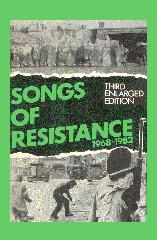
Dal volumetto Songs of Resistance 1968-1982, di cui mi hanno portato una copia. A pagina 1 è presente il testo inglese; il presente testo in gaelico è a pagina 64. Ignoro se la redazione originale di Paddy (o Pat) McGuigan sia stata in inglese o in gaelico, ma forse direttamente in entrambe le lingue. [RV]
Irish Gaelic version

Dal volumetto Songs of Resistance 1968-1982, di cui mi hanno portato una copia. A pagina 1 è presente il testo inglese; il presente testo in gaelico è a pagina 64. Ignoro se la redazione originale di Paddy (o Pat) McGuigan sia stata in inglese o in gaelico, ma forse direttamente in entrambe le lingue. [RV]
FIR NA CISE FADA
Thóg siad leo na buachaillí
Gunnaí ag bagairt ar gach taobh
Ach seasaimid go dílis, dian
Le fir na cise fada
An mhaidín úd ar fud Bhéal Feirste
Agus solas fós go fann
Tháinig saighdiúirí ar thithe ann.
Gan aon aird or ghol na bpaistí
Stracadh aithreacha chun siúil
Léasadh mic ós comhair na máthar
Fuil ar cheann, ar bhéal, ar shúil
Ní dóibh siúd aon Bhreitheamh cúise
Ní dóibh siúd aon chúirt na coir
Leor gur Gaeil iad, tá siad ciontach
Ciontach sinn go léir, mar sinn.
Cloisfear é ar fud na cruinne
Dubhshliocht Chromail linn athuair
Feicfear feall is fóirneart Shasain
Cáinfear iad ós comhair na slua
Siúlaimís faoi bhrat ár dtíre
Seasaimís ar thaobh na bhfear
Beidh siad saor chun cabhrú linn
Náisiúr, a thógáil, saor is ceart.
Gluaisimís ar aghaidh le chéile
Céim ar chéim, go bródúil, dian
Leanimís gan teip, go dtiocfaidh
Fir na cise abhaile arís.
Thóg siad leo na buachaillí
Gunnaí ag bagairt ar gach taobh
Ach seasaimid go dílis, dian
Le fir na cise fada
An mhaidín úd ar fud Bhéal Feirste
Agus solas fós go fann
Tháinig saighdiúirí ar thithe ann.
Gan aon aird or ghol na bpaistí
Stracadh aithreacha chun siúil
Léasadh mic ós comhair na máthar
Fuil ar cheann, ar bhéal, ar shúil
Ní dóibh siúd aon Bhreitheamh cúise
Ní dóibh siúd aon chúirt na coir
Leor gur Gaeil iad, tá siad ciontach
Ciontach sinn go léir, mar sinn.
Cloisfear é ar fud na cruinne
Dubhshliocht Chromail linn athuair
Feicfear feall is fóirneart Shasain
Cáinfear iad ós comhair na slua
Siúlaimís faoi bhrat ár dtíre
Seasaimís ar thaobh na bhfear
Beidh siad saor chun cabhrú linn
Náisiúr, a thógáil, saor is ceart.
Gluaisimís ar aghaidh le chéile
Céim ar chéim, go bródúil, dian
Leanimís gan teip, go dtiocfaidh
Fir na cise abhaile arís.
inviata da Riccardo Venturi - 26/7/2014 - 09:29
Lingua: Italiano
Versione italiana di Riccardo Venturi
21 agosto 2006
21 agosto 2006
GLI UOMINI DIETRO AL FILO SPINATO
Autoblindo, carri armati e armi
vennero a portar via i nostri figli
ma ognuno deve sostenere
gli uomini dietro al filo spinato
Per le stradine di Belfast
nel buio di ogni mattino
i soldati inglesi venivano a depredare
distruggendo sprezzanti le casette
Non curandosi dei bambini in lacrime
tirando giù i padri dai loro letti
picchiando i figli, mentre le madri impotenti
guardavano il sangue che colava loro dalle teste
Per loro nessun giudice, nessuna giuria
e neppure un processo che fosse uno
ma essere irlandesi significa essere colpevoli
e quindi siamo colpevoli tutti quanti
Per tutto il mondo la verità echeggerà
i cromwelliani sono di nuovo qui
il nome dell’Inghilterra è di nuovo insozzato
agli occhi della gente onesta.
Fieri marciamo sotto il nostro stendardo
sosterremo compatti i nostri uomini
li faremo liberare perché ci aiutino
a ricostruire una nazione
E la gente continua a marciare assieme
fiera e compatta sulla sua strada
mai paura, mai esitazione
finché i ragazzi non saranno a casa per restarci.
Autoblindo, carri armati e armi
vennero a portar via i nostri figli
ma ognuno deve sostenere
gli uomini dietro al filo spinato
Per le stradine di Belfast
nel buio di ogni mattino
i soldati inglesi venivano a depredare
distruggendo sprezzanti le casette
Non curandosi dei bambini in lacrime
tirando giù i padri dai loro letti
picchiando i figli, mentre le madri impotenti
guardavano il sangue che colava loro dalle teste
Per loro nessun giudice, nessuna giuria
e neppure un processo che fosse uno
ma essere irlandesi significa essere colpevoli
e quindi siamo colpevoli tutti quanti
Per tutto il mondo la verità echeggerà
i cromwelliani sono di nuovo qui
il nome dell’Inghilterra è di nuovo insozzato
agli occhi della gente onesta.
Fieri marciamo sotto il nostro stendardo
sosterremo compatti i nostri uomini
li faremo liberare perché ci aiutino
a ricostruire una nazione
E la gente continua a marciare assieme
fiera e compatta sulla sua strada
mai paura, mai esitazione
finché i ragazzi non saranno a casa per restarci.
Mi pare che la foto del gruppo non ritragga Paddy McGuigan e i suoi Barleycorn, bensì la band dei Wolfhound (in primo piano Danny Burns).
La foto corretta dei Barleycorn è la seguente, con Paddy McGuigan primo a sinistra.
(Bernart Bartleby)
La foto corretta dei Barleycorn è la seguente, con Paddy McGuigan primo a sinistra.
(Bernart Bartleby)
Sostituita l'immagine, magari rimettiamola in qualche canzone dei Wolfhound...
×
![]()

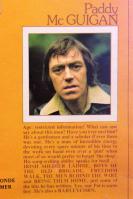
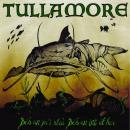
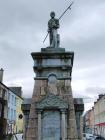
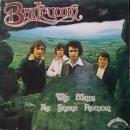

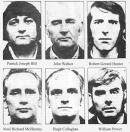
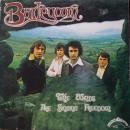
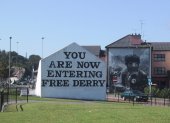
Written by Paddy McGuigan
Scritta da Paddy McGuigan
An Irish republican song composed in the aftermath of the imposition of Internment without trial on some Irish republicans associated with Provisional Sinn Féin (now known simply as Sinn Féin) and other unconnected with militant republicanism who had been arrested by mistake in Northern Ireland in 1971. Three hundred and forty-two people, the oldest a man of 77, were interned on 9 August, 1971. The lyrics record the raiding of homes by the British Army and the Royal Ulster Constabulary and the arrest of individuals who were detailed without trial in Long Kesh, a prison in Northern Ireland subsequently known as the Maze Prison. The central message of the song was a call for republican community 'solidarity' with the 'men behind the wire' of Long Kesh. Pat McGuigan was interned just for writing this song.
Though regularly sung in the 1970s and early 1980s, the song is less often heard now, and more associated with extreme republican movements like the Real IRA than with modern-day Sinn Féin and the Provisional IRA, in the aftermath of the 'cecession' of acts of violence of the latter, and the entry of Sinn Féin into a power-sharing executive governing Northern Ireland under the Belfast Agreement.
Canzone repubblicana irlandese composta successivamente all'imposizione dell'internamento senza processo per alcuni repubblicani irlandesi associati al "Sinn Féin provvisorio", i "Provisionals", e per altri non legati alla militanza nell'IRA, ma arrestati per errore in Irlanda del Nord nel 1971. Il 9 agosto 1971 furono internate 342 persone, la più anziana delle quali era un uomo di 77 anni. La canzone parla della devastazione delle case da parte dell'esercito britannico e del Royal Ulster Constabulary, e dell'arresto di singole persone che furono poi detenute a lungo a Long Kesh, una prigione nordirlandese che fu poi nota come Maze e dove, nel 1981, si svolse lo sciopero della fame iniziato da Bobby Sands. Il messaggio principale della canzone fu un richiamo alla solidarietà della comunità repubblicana con gli "uomini dietro al filo spinato" di Long Kesh. Paddy McGuigan fu poi internato anche lui per aver scritto questa canzone.